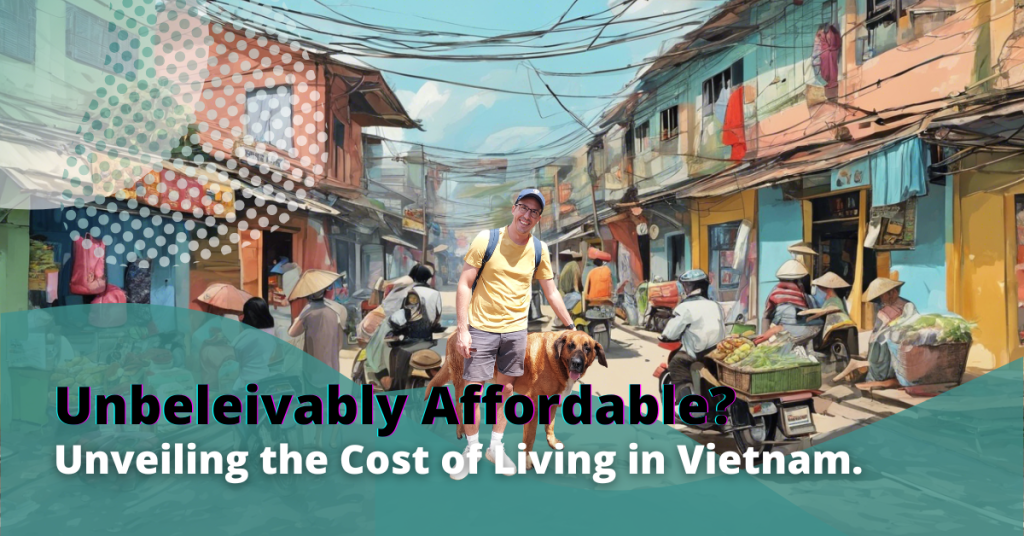The best expat lifestyle always teeters on the balance of “How much can I earn?” and “How much can I save?”. I know this because I’m an expat or an immigrant; whatever you want to call it.
When looking for a new country to live in, or even your first expat destination, the amount of money that you can save as an expat will likely determine where you call home for the foreseeable future. When considering Southeast Asia specifically, the low cost of living in Vietnam and high expat wages usually makes it a frontrunner when compared to its more developed Asian counterparts.
Furthermore, while the economy is progressing at a quick pace, the cost of living in Vietnam is projected to remain affordable. Read on to dive into the average costs you’ll face when in Vietnam, including those for accommodation, food, transportation and healthcare. Hopefully, this will help you plan any potential move and to effectively navigate your personal finances when you arrive.
Overall cost of living in Vietnam
According to the data from Numbeo, Ho Chi Minh City and Hanoi are the most expensive cities in Vietnam – although this isn’t unexpected considering these cities are the country’s major metropolitan areas. The numbers further show that:
- The monthly cost for a family of four is roughly $1,630, excluding rent
- A single individual can live off of ~$460 per month, excluding rent
- In Hanoi and Ho Chi Minh City, rent can be anywhere from $280-$3,000/month for 1 or 2-bedroom apartments
- Living outside the major metropolitans, in cities such as Da Nang, Hoi An, Vung Tau and Nha Trang you can expect costs to be 20-50% less
Having lived in Vietnam for 5 years, I can say that any expats living or considering moving here should take these figures with a pinch of salt. While it is certainly possible to live within this price range, the reality is that we end up spending more because of personal habits and choices. For example, most expats won’t eat from local restaurants 3 times a day, nor stick to cheap bia hoi when on nights out.
Luxury goods in Vietnam do cost a premium and can, in some cases, be comparable to “Western” prices. Your overall cost of living in Vietnam will, therefore, be completely dependent on your spending habits, just like anywhere. Hopefully, you already have a grip on your personal finances though, and can use the following costs to see what your monthly expenses in Vietnam would look like.
Accommodation costs in Vietnam
Compared to many other countries, accommodation in Vietnam is reasonably inexpensive, especially in cities outside of Ho Chi Minh City and Hanoi. Unfortunately, just like in most countries, rental prices continue to increase drastically despite rental demand decreasing throughout 2023. The VNExpress reported earlier this year that rental increases in HCMC would be anywhere between 15%-20% which really shows that while the cost of living in Vietnam is currently low, it will likely increase drastically over the next few years.
The following is an overview of what you can expect to pay for different types of accommodation in some of the bigger cities in Ho Chi Minh City, Hanoi and Da Nang, courtesy of Dot Property.
Budget accommodation
Private, albeit budget, accommodation throughout the country varies, but where expats tend to emigrate you can expect the following monthly rent for a 1 bedroom serviced apartment without amenities.
- Ho Chi Minh City: 5,000,000₫-10,000,000₫ VND ($200-$400 USD)
- Hanoi: 6,000,000₫-10,000,000₫ ($240-$400 USD)
- Da Nang: 3,500,000₫-8,500,000₫ VND ($140-$340 USD)
Mid-range accommodation
Considering a 2-bedroom apartment in a decent complex with amenities such as a pool and gym, you can expect to pay the following per month:
- Ho Chi Minh City: 12,000,000₫-30,000,000₫ VND ($480-$1,200 USD)
- Hanoi: 13,000,000₫-30,000,000₫ ($520-$1,200 USD)
- Da Nang: 7,500,000₫-20,000,000₫ VND ($300-$800 USD)
Upper-end accommodation
For 3 to 4-bedroom apartments in luxury complexes suitable for families, rent prices increase sharply but you can also find good deals. Expect to a monthly cost of:
- Ho Chi Minh City: 35,000,000₫-90,000,000₫ VND ($1,400-$3,600 USD)
- Hanoi: 25,000,000₫-75,000,000₫ ($1,000-$3,000 USD)
- Da Nang: 20,000,000₫-35,000,000₫ VND ($800-$1,400 USD)
Food and grocery expenses in Vietnam
Swiftly moving on, when reviewing the data from Numbeo you can see that while some groceries are significantly cheaper than in the “West”, it really depends on the purchase. This is because some products aren’t as readily purchased as others due to cultural differences so if you want your home comforts your cost of living in Vietnam will be higher. Milk and cheese, for example, is likely going to be more expensive than you’re used to.
The following table highlights the average prices of staple produce purchased at supermarkets throughout the country.
| Produce | Average Cost (VND) | Average Cost (USD) |
|---|---|---|
| Milk (regular), (1 litre) | 36,396 ₫ | $1.46 |
| Loaf of White Bread | 25,033 ₫ | $1.00 |
| Rice (white), (1 kg) | 22,827 ₫ | $0.91 |
| Eggs (regular) (12) | 40,201 ₫ | $1.61 |
| Chicken Fillets (1 kg) | 90,947 ₫ | $3.64 |
| Apples (1 kg) | 79,265 ₫ | $3.17 |
| Banana (1 kg) | 26,333 ₫ | $1.05 |
| Oranges (1 kg) | 36,641 ₫ | $1.47 |
| Tomato (1 kg) | 26,387 ₫ | $1.06 |
| Potato (1 kg) | 29,850 ₫ | $1.19 |
| Onion (1 kg) | 29,447 ₫ | $1.18 |
| Lettuce (1 head) | 20,335 ₫ | $0.81 |
| Water (1.5 litre bottle) | 12,622 ₫ | $0.50 |
| Domestic Beer (0.5 litre bottle) | 20,814 ₫ | $0.83 |
| Imported Beer (0.33 litre bottle) | 34,922 ₫ | $1.40 |
| Cigarettes 20 Pack (Marlboro) | 31,500 ₫ | $1.26 |
Transportation and utility costs in Vietnam
Throughout this article I’ve mentioned that the cost of living in Vietnam is cheap, but you’ll likely be surprised by how affordable everyday essentials are. From taxis and internet to water and data plans, your costs will likely be significantly lower than what you’re used to. While the reason is nearly always lower running costs, it’s always a welcome change knowing that you can get unlimited data for $2-3 a month.
Price of transportation
Taking trains around Vietnam isn’t very common and with the metros still being built, there aren’t too many options in the way of public transport. However, due to the lack of railway infrastructure, buses, mini-vans and private transport still reign supreme and some transportation costs can be seen in the table below.
| Mode of Transport | Intra-city travel (one-way and distance depending) | Inter-city travel (one-way and city dependent) |
|---|---|---|
| Bus | 7,000₫-10,000₫ ($0.28-$0.40 USD) | 150,000₫-800,000₫ ($6.00-$32.00 USD) |
| Grab, Be, Gojek motorbike taxi (Ridesharing apps) | 10,000₫-80,000₫ ($0.40-$3.20 USD) | N/A |
| Grab, Be, Gojek car taxi (Ridesharing apps) | 40,000₫-350,000₫ ($1.60-$14.00 USD) | N/A |
| Private car transport | 140,000₫-500,000₫ ($5.60-$20.00 USD) | 1,000,000₫-6,000,000₫ ($40-$240 USD) |
Standard utility costs
The table below shows average prices for various utility bills and while they do, of course, vary depending on usage, your budget won’t be too off if you take these costs into account.
| Utility | Average monthly price (VND) | Monthly price (USD) |
|---|---|---|
| Electricity | 500,000₫-1,000,000₫ | $20-$40 |
| Water | 60,000₫ | $2.40 |
| Gas | 60,000₫ | $2.40 |
| Fibre optic internet/broadband | 270,000₫ | $10.80 |
| Cable TV | 150,000₫ | $6.00 |
| Mobile data | 70,000₫ | $2.80 |
| Apartment management fee | 1,000,000₫-1,500,000₫ | $40-$60 |
| Apartment complex parking (motorbike) | 80,000₫ | $3.20 |
Healthcare costs in Vietnam
Vietnam’s public healthcare system faces numerous challenges, including outdated infrastructure, overcrowding and a lack of funding. And, while the government is making an effort to improve healthcare accessibility, there is still a significant divide between local medical care and that provided in international clinics and hospitals.
The following table highlights and compares the cost of various local medical care versus the price of services sought at international hospitals and clinics in Vietnam.
| Medical care | Rough prices at local clinics and hospitals | Rough prices and international clinics and hospitals |
|---|---|---|
| General practitioner | 260,000₫-400,000₫ ($10.40-$16.00) | 1,500,000₫-2,200,000₫ $60.00-$88.00) |
| Specialist consultation | 150,000₫-500,000₫ ($6.00-$20.00) | 2,000,000₫-3,700,000₫ ($80.00-$148.00) |
| OB-GYN | 250,000₫-400,000₫ ($10.00-$16.00) | 1,000,000₫ ($40.00) |
| Physiotherapy | 200,000₫-400,000₫ ($8.00-$16.00) | 800,000₫-1,500,000₫ ($32.00-$60.00) |
| Acupuncture | 120,000₫-250,000₫ ($4.80-$10.00) | 600,000₫-800,000₫ ($24.00-$32.00) |
| Routine blood test | 150,000₫ ($6.00) | 900,000₫-1,500,000₫ ($36.00-$60.00) |
| Extensive blood test | 350,000₫-450,000₫ ($14.00-$18.00) | 3,700,000₫-5,000,000₫ ($150.00-$200.00) |
| Blood pressure test | 100,000₫ ($4.00) | 500,000₫ ($20.00) |
| X-ray | 150,000₫-200,000₫ ($6.00-$8.00) | 800,000₫ ($32.00) |
| MRI/CT/PET scans | 1,500,000₫-3,000,000₫ ($60.00-$120.00) | 10,000,000₫-13,700,000₫ ($400.00-$550.00) |
| Outpatient intravenous drip | 300,000₫-600,000₫ ($12.00-$24.00) | 2,500,000₫ ($100) |
| Angioplasty / Heart surgery | 70,000,000₫-100,000,000₫ ($2,800-$4,000) | 500,000,000₫-1,000,000,000₫ ($20,000-$40,000) |
| Repairing torn tendons and ligaments | 40,000,000₫-75,000,000₫ ($1,600-$3,000) | 150,000,000₫-210,000,000₫ ($6,000-$8,400) |
| Inpatient broken bone surgery | 25,000,000₫-35,000,000₫ ($1,000-$1,400) | 100,000,000₫-150,000,000₫ ($4,000-$6,000) |
| Hernia repair | 40,000,000₫ ($1,600) | 120,000,000₫-170,000,000₫ ($4,800-$6,800) |
Fortunately, you don’t have to carry the cost of medical expenses alone. By proactively planning ahead with health insurance, you can transfer the risk of financial loss to a third party. Of course, you have to find a good expat health insurance provider to ensure that you will be covered should something untoward happen.
Don’t Forget Financial Planning
Due to the low cost of living in Vietnam, emigrating to the country can be an incredibly fun and affordable experience. Between the wages and average costs, it is possible to save a bunch of money while still enjoying a high quality of life.
Unfortunately, the trouble starts when the very real threat of lifestyle creep takes hold. More often than not, expats in Vietnam tend to get a little carried away: taking advantage of the excess disposable income to purchase fun things or relish in one too many holidays.
I always tell my clients that while there’s nothing wrong with spending money(!) you just need to be mindful that your financial decisions aren’t hampering your future financial goals.
Because what’s more important?
Going on a fourth holiday this year, or having a down deposit for a house when you do eventually move home?


